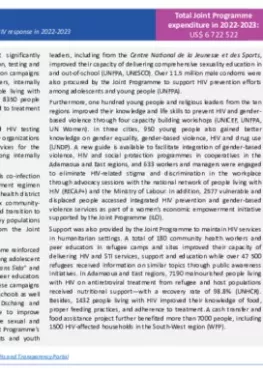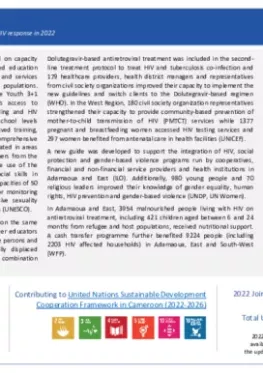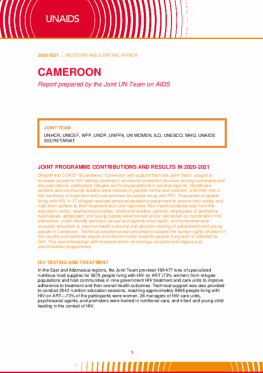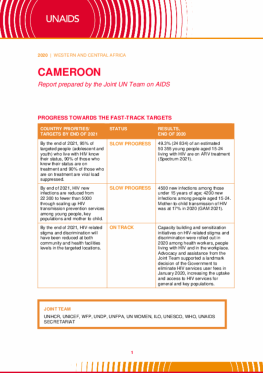Capacity building and technical support by the Joint Programme reinforced comprehensive sexuality education and HIV knowledge among adolescent and young people. For instance, as part of the “Vacances sans Sida” and “Mois Camerounais Contre le Sida” campaigns, 200 young peer educators were empowered to raise awareness among their peers. These campaigns reached more than 26 000 adolescents and young people in schools as well as youth networks and platforms (WHO). Bafoussam, Dschang and Foumban districts also launched the Youth 3+1 initiative to improve adolescents' and young people's access to comprehensive sexual and reproductive health and HIV services (UNICEF). With the Joint Programme’s support, around 900 teachers, youth supervisors, students and youth leaders, including from the Centre National de la Jeunesse et des Sports, improved their capacity of delivering comprehensive sexuality education in and out-of-school (UNFPA, UNESCO). Over 11.5 million male condoms were also procured by the Joint Programme to support HIV prevention efforts among adolescents and young people (UNFPA).
Furthermore, one hundred young people and religious leaders from the ten regions improved their knowledge and life skills to prevent HIV and gender-based violence through four capacity building workshops (UNICEF, UNFPA, UN Women). In three cities, 950 young people also gained better knowledge on gender equality, gender-based violence, HIV and drug use (UNDP). A new guide is available to facilitate integration of gender-based violence, HIV and social protection programmes in cooperatives in the Adamaoua and East regions, and 633 workers and managers were engaged to eliminate HIV-related stigma and discrimination in the workplace through advocacy sessions with the national network of people living with HIV (RECAP+) and the Ministry of Labour. In addition, 2577 vulnerable and displaced people accessed integrated HIV prevention and gender-based violence services as part of a women’s economic empowerment initiative supported by the Joint Programme (ILO).
Support was also provided by the Joint Programme to maintain HIV services in humanitarian settings. A total of 180 community health workers and peer educators in refugee camps and sites improved their capacity of delivering HIV and STI services, support and education while over 47 500 refugees received information on similar topics through public awareness initiatives. In Adamaoua and East regions, 7190 malnourished people living with HIV on antiretroviral treatment from refugee and host populations received nutritional support—with a recovery rate of 98.8% (UNHCR). Besides, 1432 people living with HIV improved their knowledge of food, proper feeding practices, and adherence to treatment. A cash transfer and food assistance project further benefited more than 7000 people, including 1500 HIV-affected households in the South-West region (WFP).





